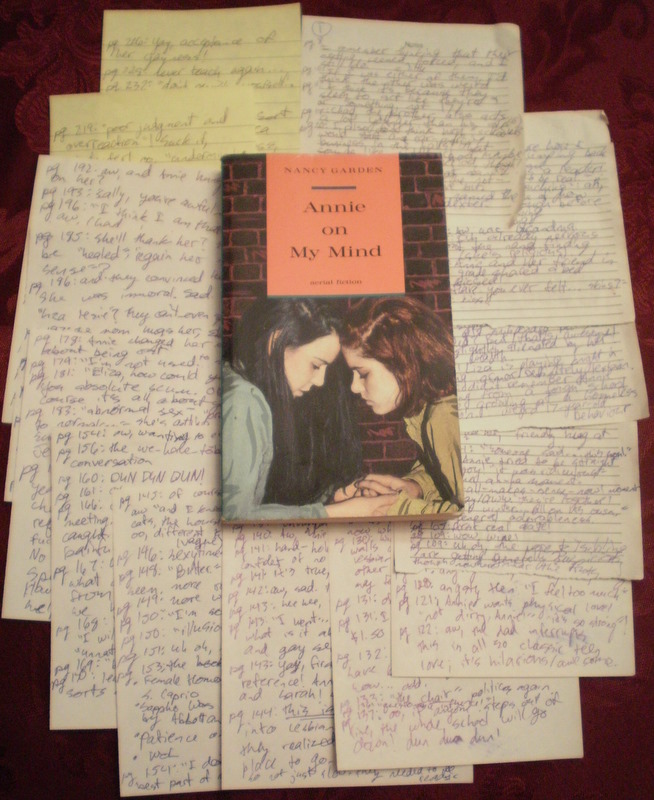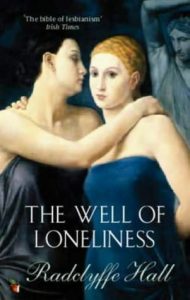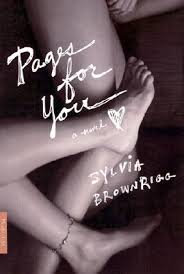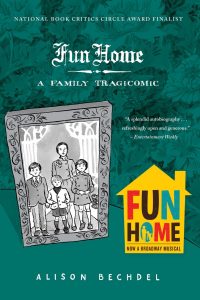 I’ll try not to repeat myself too much, but look at the diligent notes I took! I had to do them justice! But I don’t think I have enough to do coherent review that wasn’t already covered in the discussion Anna and I had. So instead, I’ll just post the thoughts I didn’t already express. These random snippets will be full of spoilers, so I’m not going to bother making you highlight for them. Consider yourself warned.
I’ll try not to repeat myself too much, but look at the diligent notes I took! I had to do them justice! But I don’t think I have enough to do coherent review that wasn’t already covered in the discussion Anna and I had. So instead, I’ll just post the thoughts I didn’t already express. These random snippets will be full of spoilers, so I’m not going to bother making you highlight for them. Consider yourself warned.
- Annie is a reader! Pg 75 of my copy, she says “I read a lot.”
- It was odd, after we got introduced to Annie’s grandmother, I was steeling myself for the inevitable awfulness of when she found out that Annie is gay. That… never happened.
- AOMM was good for seeing into Liza’s strange, sheltered little world. I come from a very different environment, and not just because it’s several decades later. For example, Liza makes her whole high school time revolve around her getting into her university of choice. I don’t think that’s quite as prevalent in Canada, or at least not in the schools I went to. Getting into a “good” university was sort of a bonus, but most of the kids from my “gifted”/whatever program ended up at one of the universities we have here, which is good, but not huge on the international map. I never gave a second thought to what university I wanted to be in when I was in high school, but maybe that was just me.
- Also, Liza had a very privileged life. I couldn’t believe that she got suspended and then didn’t get grounded. Especially since her dad was so mad at first. What’s the downside to being able to not have to go to school and not be grounded? That’s not a punishment! But that was about as far as punishments went in her case, and she was devestated. I’d be celebrating, and I wasn’t even a bad student.
- I liked the idea of how her school was supposed to run, though, obviously, it would have to be without the corruption. The sort of democratic system of running it seemed like a fair way to do it.
- I loved when Liza literally played knight in shining armor. That’s such classic lesbian-in-love.
- Liza and Annie, but especially Liza, are very odd. The make believe, the singing at the museum, and then at some point Liza growls at a homeless person. This is not normal high school senior behavior.
- Baxter and Poindexter are so very pathetic.
- There are actually a lot of points in the novel that I thought were foreshadowing, but didn’t really lead to anything. “Oh no, her brother is getting suspicious! … No, no, he’s over it.”
- Sally takes a nose dive as a character. By the end I had a seething hatred for her.
- AOMM has a great passage that describes exactly why I’m so into lesbian lit. “I felt as if I were meeting parts of myself in the gay people I read about. Gradually, I began to feel calmer inside, more complete and sure of myself […]” My favourite part of AOMM is the literature references.
- I got absolutely furious in my notes when Annie and Liza get caught and lectured. Some excerpts: [to Baxter] “You absolute scum”, “**** you, Sally/Walt!” “How dare you!” and later: “Suck it, Poindexter!” … I swear I’m not usually like this. It was a very emotional part of the story.
- Another example of Liza’s strange little life: she had never lied to her parents before the whole gay thing. Never. About anything.
- Near the end of the book, Liza writes down “Running through my head – running through my head”. Am I the only one who couldn’t help thinking of the tatu song?
Have you read Annie On My Mind? What did you think of it?




 Do not let this be the first lesbian book you read! If I was doing this list by order of which is most classic, I would start with this one, but it violated my cardinal rule: don’t be depressing. I recommend Well of Loneliness because it’s a classic (published in 1928), because it was actually surprisingly not very difficult to read, and because it was judged as obscene although the hot lesbian love scene consisted entirely of “And that night they were not divided”, but it’s not a pick-me-up book. In fact, if it wasn’t such a classic, I never would have read it at all; I refuse to read books that punish characters for being queer. I also got the suspicion while reading it that the protagonist was transgender, not a lesbian. Lesbian (or transgender?) author.
Do not let this be the first lesbian book you read! If I was doing this list by order of which is most classic, I would start with this one, but it violated my cardinal rule: don’t be depressing. I recommend Well of Loneliness because it’s a classic (published in 1928), because it was actually surprisingly not very difficult to read, and because it was judged as obscene although the hot lesbian love scene consisted entirely of “And that night they were not divided”, but it’s not a pick-me-up book. In fact, if it wasn’t such a classic, I never would have read it at all; I refuse to read books that punish characters for being queer. I also got the suspicion while reading it that the protagonist was transgender, not a lesbian. Lesbian (or transgender?) author. 1)
1) 
